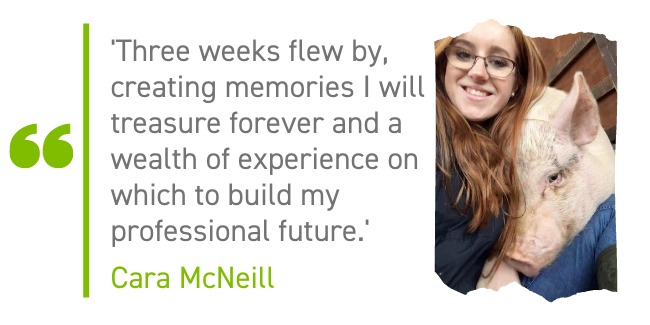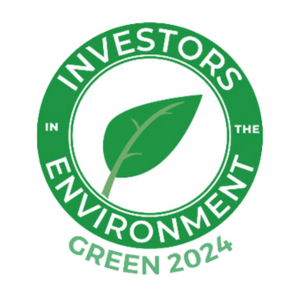
Diary of a Veterinary Student: On live-in placement at an equine hospital
Hi! My name is Cara McNeill and I’m about to start my 4th year at Glasgow Vet School. Earlier this year, I was fortunate enough to receive an AVS grant, sponsored by VDS Training, which enabled me to go to take up a live-in EMS placement at a 20-vet equine first opinion and referral hospital. I hope you enjoy this snapshot of my time there. Day 1: After a last-minute hiccup (the realisation I’d entered the small animal practice address into Google Maps, rather than that of the equine unit – oops!) I left home at some unearthly hour to get to the practice by 8am, arriving of course far earlier than planned. I was greeted by a friendly receptionist and, this being Covid-times, asked to take a lateral flow test before being allowed into the premises. After an anxious wait and a negative result, I was welcomed by one of the residents and introduced to everybody. The practice offers IMR placements for another vet school, so I was relieved to see some final year students – at least I wouldn’t be alone! After a long day spent observing and holding horses, I was shown to the static caravan that I would call home for the next 3 weeks. After a quick dinner, I headed to bed, exhausted but happy after a long day. Day 2: Each morning commenced with the interns and students completing TPRs and checks on the inpatients before presenting them at rounds. Not yet feeling part of the team, I was grateful to the intern who showed me the ropes and what paperwork to complete. I was then assigned to my first task of the day - holding a horse for an MRI. This took much longer than I had anticipated, was more challenging than it sounds (as the patient insisted on moving at every crucial moment) and left me wondering quite why I’d been so keen on this placement… Fortunately I then had the chance to observe my first equine GA which was undergoing a joint flush by arthroscopy - which was fascinating. The procedure went well, the recovery was textbook, and I remembered why I’d wanted to do EMS in an equine hospital! Day 3: My first turn to present at rounds, so I was nervous, but managed to summarise the details of the case without tripping over my words too much. Despite being quite happy to take histories and chat with clients, I realised that it’s a different matter when your audience includes experts! Another first was just around the corner as the previous day we’d split up the on-call rota, and tonight was my night! It turned out to be an amazing introduction to equine ‘on call’ with the chance to watch a foaling, which I had never seen before, and the emergency arrival of a chest wound turned out to be not as drastic as was anticipated. I even managed some sleep – a pleasant introduction to being on call! Day 5: In the morning I assisted in the dental suite, helping take x-rays and watching screws being removed from a horse’s jaw after successful treatment for a mandibular fracture. This was especially interesting, as one of the reasons I’d wanted to do this placement was to see some vet-led equine dentistry. There was a lull in activity after lunch, but I was soon to experience that there’s no such thing as a free afternoon for a vet student; one of the clinical directors came into the staff room and asked another student and I if he could film us for a presentation he was doing about the future of the profession. This was a nerve-wracking experience, made worse by having to watch ourselves back afterwards – I’m not sure anyone likes the sound of their own recorded voice! However, it was interesting to hear other opinions, and the topic was, of course, a very important and ever pertinent issue. Days 6 and 7: My first weekend on call! On the basis of ‘safety in numbers’ myself and the other student in the caravan decided to share the duties. I was called at midnight to help with the AI of a mare. Being the student on call means you are able to participate more, and I was given the opportunity to rectal the mare and feel the ovaries – another first for me. The following night saw the arrival of a colic which was rushed immediately into surgery where strangulating lipomas were confirmed and removed. I was involved in preparing the patient and monitoring the anaesthetic while the other student scrubbed in. Day 8: Tired after a weekend with limited sleep, but happy to have experienced my first surgical colic, I spent much of the day on the road with one of the clinical directors. This involved observing a range of first opinion cases, including blood-sampling for suspected ragwort toxicity and a five-stage vetting. Day 9: Another night on call, this one slightly more taxing than my previous experiences, as I had to get up every 4 hours to assist with passing a nasogastric tube in the aforementioned colic patient. The patient was refluxing but fortunately started to improve as the night progressed. Day 10: A day of surgeries! I had observed a laryngeal paralysis diagnosis the day before and was able to follow the case to a standing laser Hobday operation. At this point of a busy day in theatre, I had already seen a GA castration and surgery for a kissing spine, so was interested to observe a standing operation for comparison. I was pleased that, at this stage of my placement, I was deemed to be trustworthy and was able to place a catheter under the watchful eye of one of the interns – so completing one of my pre-placement learning objectives. In a busy hospital it can be easy to “forget” the student, and I’m grateful that this wasn’t the case throughout my placement where students are involved with practical skills from very early on. Day 13: Another weekend on call – as the previous week’s arrangement had worked so well, we decided to do the same thing again, chipping in to help each other. A kick wound to the head came in as an emergency admission, and while supervised, the students were allowed to suture the wound. It was a relief the next day when the bandages were changed and our sutures were still in place and looking good! Day 17: I experienced another “first” today when I spent the morning assisting in giving IPPV to a horse that was having a sarcoid removed by laser therapy. My task was made more challenging by the protective safety goggles we had to wear and the fact that I had a dead arm from my COVID vaccine the day before! However, I helped to keep the patient ventilated satisfactorily, and was able to assist with the recovery using head and tail ropes – something that is a lot harder than it looks and made me realise I may need to go to the gym more often! Day 18: EMS students at the practice are asked to do a presentation for the vets. I’d rather hoped that this applied only to the vet school students on rotation and that I had slipped under the net, but this wasn’t the case and I was given the topic of arthrodesis, as I had seen a couple of these cases during my time at the hospital. As with anything involving public speaking, I was nervous, and having put together a PowerPoint at the end of the long days, was not altogether confident. However, it seemed to go down well as Thursday morning CPD and I was let off lightly with the questioning! Day 19: My last day! We’d treated ourselves to a takeaway meal the night before to celebrate (and to save cooking!). I was sad to be leaving, as I’d had the most amazing experience, made friends with the other students, and seen a variety of cases - as well as gaining a lot of hands-on experience. Appropriately, having come to the practice to see some equine dentistry, I spent most of the day in the dental theatre, helping with packing removal, a sinus flush and advanced dental. All too soon, the time came for me to pack my bags, load my car, and say goodbye to everybody, promising that I would be back if I could. And just like that, three weeks had flown by, creating memories I will treasure forever and a wealth of experience on which to build my professional future. I would like to thank AVS and VDS Training for sponsoring the awards that made this EMS opportunity possible for me – thanks to their generosity, I was able to stay on site and experience being on call at the weekends, taking time off from the part-time job that usually funds my EMS. Thanks too to the team at the practice, which tirelessly and patiently hosts a stream of students – and to the students from the other vet school, who discovered a Glasgow student in their midst but survived to tell the tale. AVS EMS Grants
For more info see AVS UK & Ireland
About VDS Training
VDS Training are passionate about developing all members of the veterinary team, to help you overcome the personal and professional challenges you face on a daily basis, and to build practical skills and techniques to make a real difference to you and your life.

